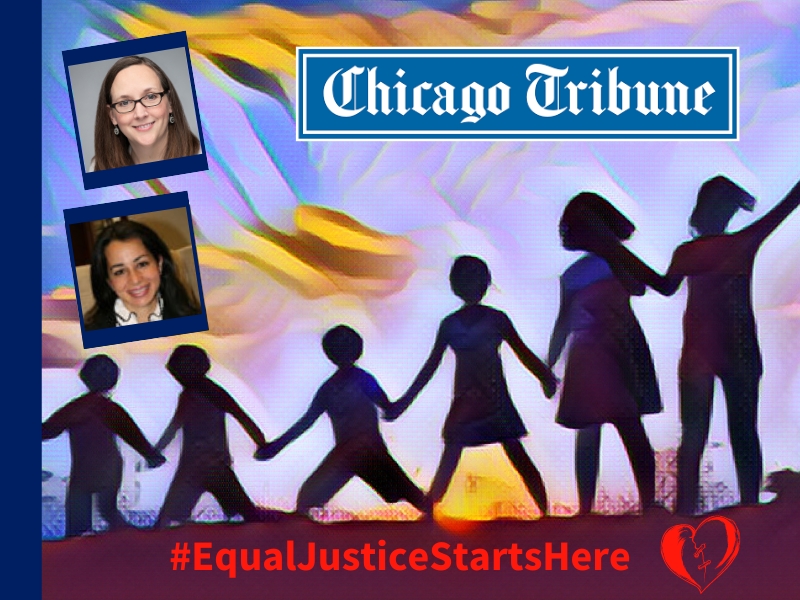Publisher: The Chicago Tribune
Published: December 1, 2022
Written: Melissa Staas (Legal Aid Chicago) and Candace Moore (Ascend Justice)
For the past 25 years, more than 2 million children have forever lost their legal relationships with their families due to a law cutting short the time needed to reunify them with their parents. Specifically, the Adoption and Safe Families Act, or ASFA, enacted in November 1997, requires states to pursue termination of the rights of parents whose children have been in foster care for 15 out of 22 months. ASFA is a relic from the era of other federal laws targeted against poor families and families of color including the “tough on crime” statutes of 1994 and the eradication of the Aid to Families With Dependent Children program in 1996.
Nonetheless, Illinois state law codifies the ASFA mandate, thereby subjecting Illinois families to the “ASFA clock.” Most of the children whose futures are governed by the ticking AFSA clock have a prior relationship with their parents and families, are children of color and are in foster care due to allegations of neglect, not physical abuse. The time their parents need to recover and heal from the conditions that the court has identified is extinguished when the ASFA clock strikes “time’s up,”
The overwhelming majority of families victimized by the stringent requirements of ASFA are not brought into the system under claims of abuse but rather claims of “neglect.” Neglect is a term used to recast hardships as child maltreatment; the mere presence of conditions such as poverty, mental illness, domestic violence and substance dependency stand in as proxies for neglect even in the absence of any harm to children.
A Legal Aid Chicago client, whom we will call Lydia, was herself in foster care when she had her first child. When her son, whom we will call Sammy, was a few months old, the Department of Children and Family Services took him into protective custody after he was in the presence of a person who had previously abused his mother, though Sammy wasn’t present for the domestic violence and was entirely unharmed.
Over the next two years, Lydia completed an ever-changing list of services, including domestic violence classes, individual therapy and intensive child-parent therapy. Nevertheless, DCFS determined Lydia, only 19 years old at the time, had not made sufficient progress within the arbitrary ASFA timelines, causing the state to obtain an order forever severing Sammy’s relationship with his mother.
Like Lydia, many parents who have been stripped of their rights to their children have experienced domestic violence in addition to challenges with their mental health and substance dependency. Lived experience, practice and research have shown that these common issues are typically not “resolvable” to the court’s satisfaction within the time frame ASFA allots. It takes a survivor of domestic violence seven times on average to find the support needed to live free of an abusive partner. Learning to manage the symptoms of a mental illness can be a long and challenging journey. Recovery from addiction is also a lifelong dynamic process in which core treatment can take years, with bouts of relapse and returns to sobriety.
Proving that parents have met the court’s parenting standards is made even more challenging by the systemic oppression of poverty and racism endemic to juvenile court caseloads. Oversurveillance, racialized socioeconomic status and other forms of institutional racism all coalesce to disproportionately dismantle Black families. Nationwide and in Illinois, Black children are four times more likely than white children to have their familial rights terminated. All parents deserve time to recover and heal, and their children deserve this opportunity before the ASFA clock ticks away the possibility of reunification.
The destructive impact of the ASFA clock is magnified by the inability of the child welfare system to meet the needs of the families it claims to serve. Excruciating delays in referring parents to services, unsupportive caseworkers, high caseloads and meager opportunities for children to spend time with their parents are all common occurrences. However, DCFS is rarely held responsible for failures to provide “reasonable efforts” to support families; conversely, caseworkers routinely expect nothing less than perfection from parents contending with past trauma and a seemingly constant stream of obstructions.
Any judicial decision to reject reunification should be based on considerations of each family’s individual circumstances rather than a federal statutory time bomb. The detonation of the ASFA timer creates generations of youths who experience the traumas and poor prognosis of foster care alongside the loss of their families, thereby deploying cyclical and compounding trauma.
For parents like Lydia and children like Sammy, a ticking clock with unyielding deadlines does nothing to improve their safety or well-being. What Lydia and Sammy needed was patience, grace, support — and, yes, time — so that Sammy could be raised by the person in the world who loved him the most.
Sara Block is managing director of advocacy and policy for legal advocacy group Ascend Justice, and Melissa Staas is the supervisory attorney for the Children and Families Practice Group at Legal Aid Chicago.

